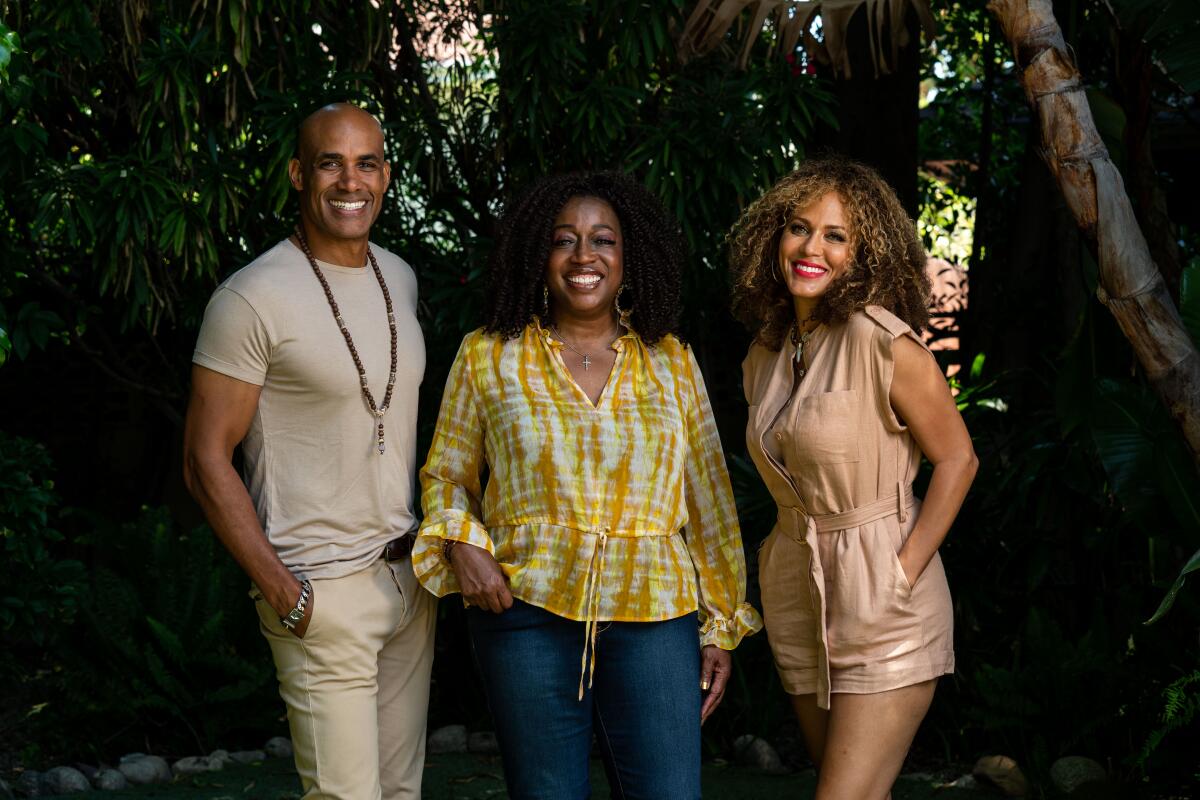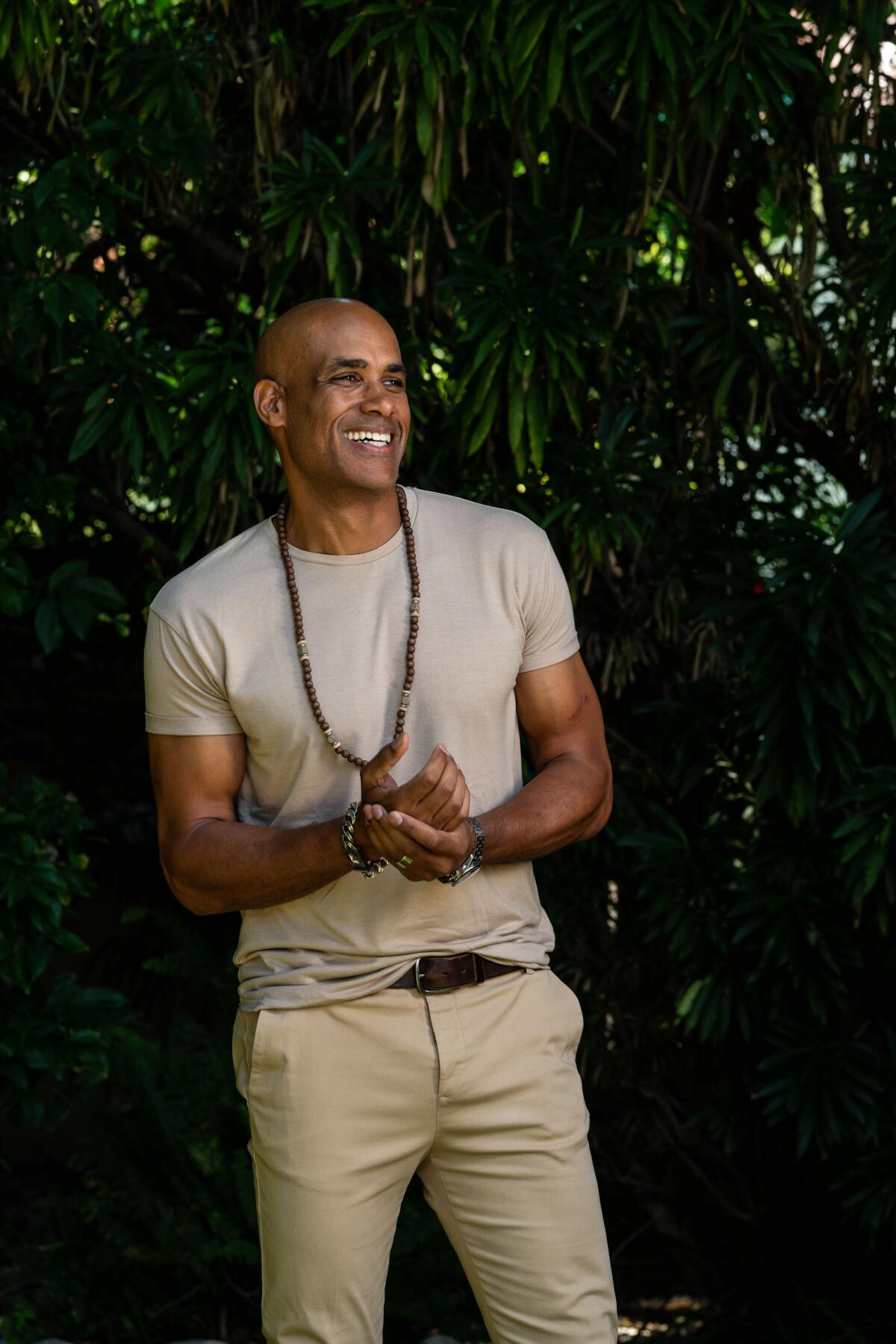Hollywood put up plenty of obstacles. ‘Soul Food’ still became a Black TV pioneer

- Share via
Before “Power” surged, before “Empire” sang, before “Greenleaf” rejoiced, “Soul Food” cooked.
The Showtime drama, about a multi-generational family whose members made it a point to always come together for Sunday dinner no matter how deep their differences, was a trailblazer, bursting into prime time during an era when dramas about Black people were a rarity. Even with a cast that was mostly unknown at the time, the series was a success, running for five seasons and demonstrating that viewers would tune into a drama centered on a Black family.
Producers and cast members are marking the 20th anniversary of the premiere — June 28, 2000 — by celebrating its legacy.
“I’m so grateful to have been part of this amazing moment in TV history,” said Felicia D. Henderson, who created the series. “It was such an uphill battle at the time. The feeling among executives in TV was that people were not interested in Black-themed dramas. There had been other dramas with Black people, but they only lasted a season.”
Boris Kodjoe, who currently stars in “Station 19,” says “Soul Food” was a professional and personal milestone for him. It marked his first major acting role, and he wound up marrying costar Nicole Ari Parker, whom he met on the set.

“The show really opened doors to a more diverse representation of Black people, and people in general,” said Kodjoe, who played Damon Carter, a messenger with a bodybuilder’s physique. “It showed real courage in going into uncharted territories, and it empowered voices like Shonda Rhimes and Kenya Barris and all the others who came after ‘Soul Food.’ ”
The series was a continuation of the film “Soul Food,” which, with its glittery cast, became a sleeper hit in 1997 — its popularity extending beyond Black audiences to attract white viewers as well.
Said Parker, who played uptight attorney Teri Joseph: “That movie really changed the landscape for Black entertainment. It showed the full spectrum of what’s inside a large family, good and bad, Black or white. There was no sugarcoating of what’s inside a big family, but at the same time, it gave the gravitas, the love and the beauty of a family that is trying to thrive.”
“Power,” Starz’s most-watched series, is coming to a close. But with multiple spinoffs in the works, the network plans to make it a “cinematic universe.”

“Soul Food” was focused on the Josephs, led by loving matriarch Big Mama Joe (Irma P. Hall). The core of the film was the electric dynamic among the three Joseph sisters and their families. Teri (Vanessa Williams) was a successful lawyer whose relationship with younger sister Maxine (Vivica A. Fox) had been strained since Maxine stole Teri’s boyfriend and married him. Youngest sister Bird (Nia Long) owned a beauty shop.
No matter their differences, the family always come together on Sundays at Big Mama’s house for a huge dinner. But when Big Mama suffers a severe stroke and winds up in the hospital, the battle among the sisters escalates.
The film’s writer and director, George Tillman Jr., wrote the script based on his experiences growing up with his family in Milwaukee. “I was writing out of desperation trying to start a career,” he said. “They always say write from your heart, and family was always important to me.”
His original script was 250 pages, which he had to cut way down for the feature. So even though the movie was a hit, he always knew he had more stories to tell that didn’t fit into the film.
Singer-songwriter Kenneth “Babyface” Edmonds and then-wife Tracey Edmonds, both producers on the film, were excited about expanding it into a TV series. Said Tracey in a 2000 interview: “We’re hoping that it’s seen as groundbreaking television. There are so many aspects of African American life that have never been shown on TV.”
The vast majority of shows that featured Black families before “Soul Food” were situation comedies that put the emphasis on laughs.
Henderson, who at that time had worked only on comedies such as “The Fresh Prince of Bel-Air,” felt a connection to the film and felt confident she could develop it into a drama.

“I had seen the film five times,” Henderson said. “I’m one of six girls. I knew I could bring an audience to a story about three sisters. My main goal was to put a Black family in front of an American audience in a three-dimensional way, to be very specific culturally but to see that they seem just like any other family in America. I would depict them with all their flaws.”
But the producers ran into obstacles. In the 2000 interview, Edmonds said that when she first proposed the movie as a series soon after its release, 20th Century Fox, which owned the picture, wanted to make it a sitcom.
Star Taraji P. Henson and showrunner Brett Mahoney reflect on six seasons of “Empire” — and how the coronavirus outbreak changed plans for its finale.
“The studio and the network just thought of it as a half-hour,” Edmonds said. “That’s not what we wanted at all. We would get in the door because of the success of the movie. But then we weren’t getting our calls returned. We lost the heat of the movie and had to start from scratch. We were so lucky Showtime believed in us.”
Added Tillman last week: “Showtime became the perfect place, because we could do a lot more with language and [were] able to stretch it out more.”
Then-Showtime President Jerry Offsay was a huge fan of “Soul Food” and felt a spinoff would fit in perfectly with the premium network’s strategy of reaching out to diverse audiences eager for more culturally oriented fare that was largely missing from network television. Showtime launched the L.A.-set Latino drama “Resurrection Blvd.” two days before the premiere of “Soul Food.”
Although the concept of a “Soul Food” series seemed promising, one drawback was that most of the original cast would not be available. But the strength of the “Soul Food” title proved strong enough that the show succeeded with a mostly unknown cast. Perhaps the biggest name in the cast was Vanessa A. Williams, who had appeared in the first season of “Melrose Place” and in the film “New Jack City.”
“We were a Black drama and we had a lot to prove,” said series cast member Rockmond Dunbar. “‘Soul Food’ showed aspects of Black love and Black romance that hadn’t really been seen before.”
Henderson and the cast are also celebrating the “Soul Food” anniversary by hosting a fundraiser Tuesday for Sybrina Fulton, who is running for Miami-Dade County commissioner, District 1. Fulton is the mother of Trayvon Martin, an unarmed Black teen who was fatally shot in 2012 (neighborhood watch volunteer George Zimmerman was found not guilty of murder in the case in 2013).
Even though the film is more than 20 years old and the series has been off the air for 15 years, Tillman said the “Soul Food” franchise still has resonance.
“I never imagined the series would last as long as it did,” he said. “‘Soul Food’ is a brand, it has tradition and pride. It’s truly been a blessing.”
More to Read
The complete guide to home viewing
Get Screen Gab for everything about the TV shows and streaming movies everyone’s talking about.
You may occasionally receive promotional content from the Los Angeles Times.








